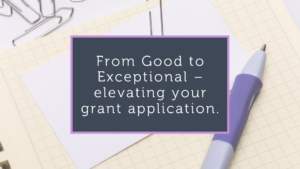Have you ever felt the sting of a grant rejection?
When the email arrives, you open it with hope, only to find that your proposal was not selected for funding. This can be a disheartening experience, one that can leave you questioning your abilities and the viability of your project. But take heart—grant rejections are a common part of the process, and they provide invaluable opportunities for growth and improvement.
This blog will help you understand rejections, cope with the emotional fallout, analyse feedback, and enhance your future proposals to increase your chances of success.
Understanding Grant Rejections
Common Reasons for Rejection
Grants are highly competitive, and understanding why your proposal was rejected is the first step towards improvement. Common reasons include non-compliance with guidelines, where even minor deviations from the stated requirements can disqualify a proposal.
A weak project design might not convincingly demonstrate the need or feasibility of your project. Budget issues, such as unrealistic or poorly justified expenses, can also raise red flags. Additionally, if the proposal lacks sufficient evidence of impact or doesn’t align well with the funder’s priorities, it’s likely to be turned down.
The Rejection Process
The rejection process often involves multiple reviewers who evaluate the proposal based on specific criteria. Understanding that this process is usually systematic and objective can help depersonalise the rejection.
It’s important to remember that rejection doesn’t necessarily reflect the quality of your work or its potential impact; it often means that other proposals better met the funder’s criteria or that there were simply more qualified applications than available funds.
Emotional Response to Rejection
Acknowledge Your Feelings
Facing rejection is tough, and it’s crucial to acknowledge your feelings rather than suppress them. It’s natural to feel disappointed, frustrated, or even angry. Accepting these emotions is the first step towards moving forward. Denial or suppression can lead to prolonged distress and hinder your ability to learn from the experience.
Positive Mindset
Maintaining a positive outlook is essential for long-term success in grant writing. View each rejection as a learning opportunity rather than a failure. This mindset shift can transform the rejection into a stepping stone towards eventual success.
Remember that many successful grant recipients faced multiple rejections before achieving their goals.
Personal Stories
Consider the story of Jane (not her real name!), one of my friends who is a researcher and had faced eight rejections before securing her first major grant. Each rejection provided her with valuable feedback and insights, which she used to refine her proposals.
Today, Jane is a successful grant writer, securing funding for her not for profit organisation. Such stories remind us that persistence and resilience are key to overcoming setbacks.
Coping Strategies
Take a Break
After receiving a rejection, it’s important to take a short break to clear your mind and reduce stress. Engage in activities that relax and rejuvenate you, whether it’s a walk in nature, a hobby, or simply spending time with loved ones. This break can provide the mental space needed to approach the feedback and next steps with a clear and focused mind.
Support Systems
Don’t hesitate to talk to mentors, colleagues, or friends about your experience. Sharing your feelings can be cathartic and provide new perspectives. Mentors and colleagues, in particular, can offer valuable advice and encouragement, having likely faced similar challenges themselves. A strong support system can help you stay motivated and resilient.
Healthy Outlets
Managing stress in healthy ways is crucial. Physical activities like yoga, running, or even dancing can help release tension and boost your mood. Mindfulness practices such as meditation can also provide clarity and calm. These activities not only help you cope with rejection but also enhance your overall well-being, making you better equipped to tackle future challenges.
Analysing Feedback
Careful Review of Feedback
Once you’re ready, carefully review the feedback provided by the grant reviewers. Approach it with an open mind, focusing on the constructive aspects rather than taking it personally. Look for specific points and common themes in the feedback that can guide your improvements.
Identifying Key Issues
Identify the key issues highlighted in the feedback. Were there specific sections that were unclear or unconvincing? Did the reviewers raise concerns about the project’s feasibility or impact? Understanding these issues will help you target the areas that need the most attention.
Consultation with Experts
If the feedback is complex or difficult to interpret, consider consulting with experienced grant writers or advisors. They can help you understand the reviewers’ comments more deeply and provide practical advice on how to address the issues. Engaging with experts can also provide new strategies and insights that you might not have considered.
Improving Future Proposals
Refining Your Ideas
A successful proposal starts with a strong and clear idea. Refine your project concept to ensure it’s well-defined and aligns closely with the funder’s priorities.
Make sure your objectives are specific, measurable, achievable, relevant, and time-bound (SMART). A well-articulated idea forms the backbone of a compelling proposal.
Strengthening the Narrative
Crafting a compelling narrative is crucial. Your proposal should tell a story that clearly communicates the need for your project, your approach, and the expected outcomes.
Use data and evidence to support your claims and demonstrate the potential impact. A strong narrative engages the reviewers and makes your proposal stand out.
Enhancing Evidence and Data
Support your proposal with robust evidence and data. This might include previous research findings, pilot study results, or testimonials from beneficiaries.
Providing concrete evidence of your project’s potential impact can significantly strengthen your proposal. Ensure that your data is current and relevant to the funder’s interests.
Budget Precision
Creating a detailed and realistic budget is essential. Your budget should accurately reflect the project’s needs and be well-justified.
Each expense should be clearly explained, showing how it has been calculated.. A precise budget demonstrates careful planning and increases the credibility of your proposal.
Compliance with Guidelines
Meticulously follow the grant guidelines and requirements. This includes adhering to word limits, formatting rules, and submission procedures. Non-compliance can lead to automatic rejection, regardless of the proposal’s quality. Double-check your proposal against the guidelines to ensure it meets all the criteria.
Peer Review
Before submitting your proposal, get it reviewed by peers or mentors or by a professional grant writer.. They can provide valuable feedback and catch errors or omissions you might have missed. Constructive criticism from trusted colleagues can help you refine your proposal and increase its chances of success.
Additional Tips
Networking with Funders
Building relationships with funders can provide valuable insights into their priorities and decision-making processes. Attend workshops, conferences, and networking events to meet funders and learn more about their interests.
Attending Workshops and Training
Participating in grant writing workshops and training programs can enhance your skills and knowledge. These programs often provide practical tips, strategies, and best practices for writing successful proposals. They also offer opportunities to network with other grant writers and professionals in your field.
Staying Updated
Stay informed about trends and changes in grant funding in your field. Subscribe to newsletters, join professional associations, and follow relevant blogs and social media accounts. Keeping up-to-date with funding opportunities and industry developments can help you tailor your proposals to current priorities and increase your chances of success.
Have you ever thought about what you could learn from a rejection?
Grant rejections, while disappointing, are valuable opportunities for growth and improvement. By understanding the reasons behind rejections, managing your emotional response, analysing feedback, and refining your future proposals, you can turn setbacks into stepping stones towards success.
Remember, persistence and resilience are key, and each rejection brings you one step closer to achieving your goals. So take the lessons learned, refine your approach, and keep pushing forward. Your next successful grant proposal might be just around the corner.
Whitney Consulting specialises in securing grants and funding for a wide range of projects. With a deep understanding of the intricacies involved in grant applications, our expert team provides tailored advice and strategies to improve your proposals. We are currently offering our grant writing services in Perth and Adelaide.
By partnering with Whitney Consulting, you will enhance your chances of securing the necessary funding to bring your projects to life. Our dedication to excellence and comprehensive support ensures that each grant application is meticulously crafted to meet the specific requirements of funders, transforming rejections into successful outcomes.






